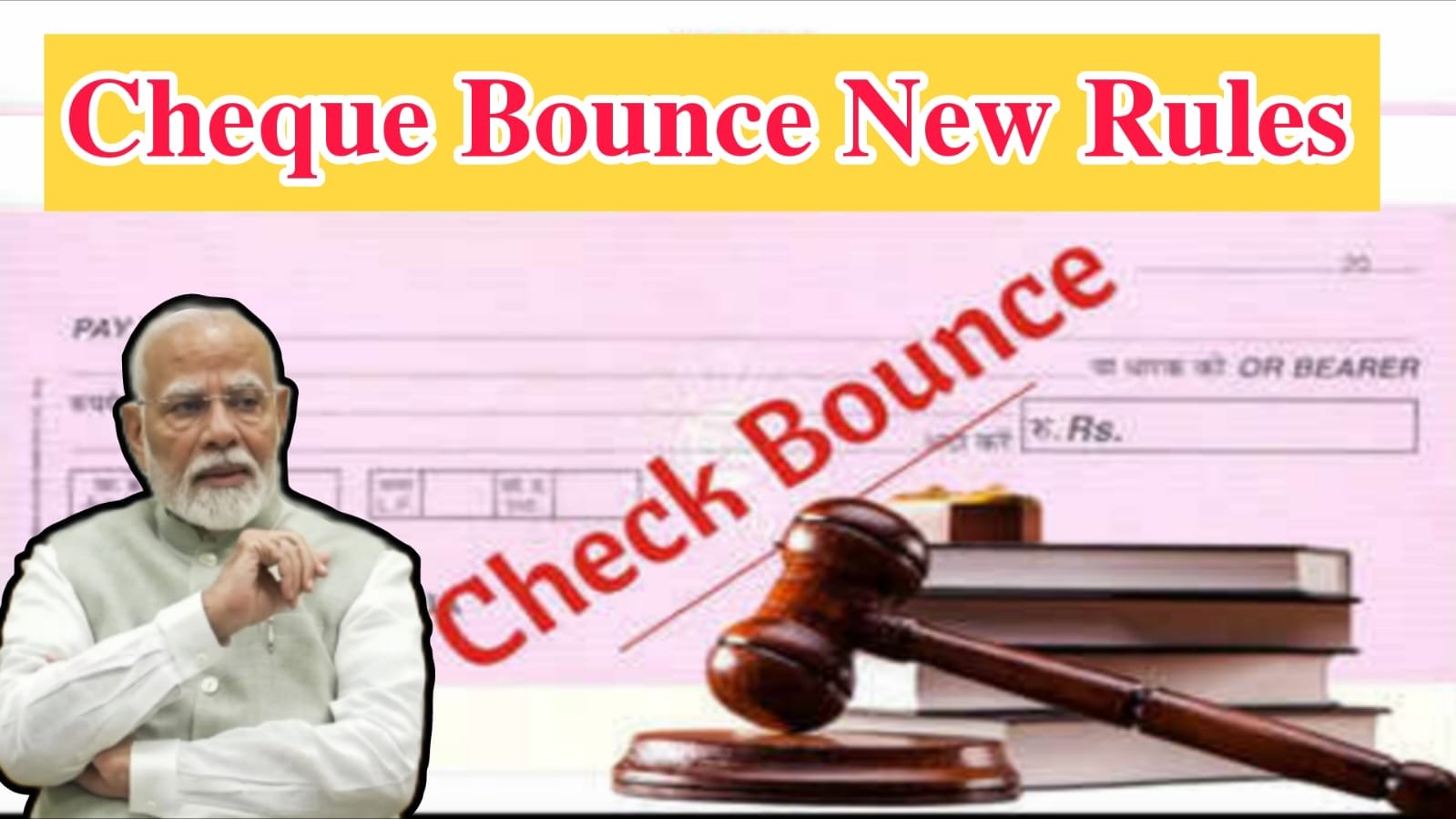Cheque Bounce New Rules : In the current era of digital transactions, many individuals still prefer using checks as a reliable and formal mode of payment. While dealing through checks is fairly straightforward, there are several rules and regulations associated with their use. As of April 1, 2025, significant changes have been implemented in the laws related to check bounce cases in India. These changes include stricter punishments, enhanced fines, faster court processes, and improved transparency in the payment system. The objective is to prevent fraud and misuse of checks and make the financial ecosystem more trustworthy.
If you are someone who conducts transactions using checks, it is important to understand how these new rules can affect you. Let’s explore all the major changes in detail and how they impact individuals and businesses.
Cheque Bounce New Rules : Stricter Penalties for Intentional Check Bounce
Under the new regulations, if it is found that a person has intentionally allowed a check to bounce (due to insufficient funds, closure of account, or any fraudulent intent), they will now face stricter punishments. The law provides for up to 2 years of imprisonment, or a fine that may amount to twice the value of the check, or both. This marks a significant tightening of enforcement compared to earlier provisions.
These provisions are covered under Section 138 of the Negotiable Instruments Act, 1881, which considers check bounce as a criminal offense. The enhanced penalties aim to act as a deterrent against deliberate financial misconduct.
Cheque Bounce New Rules : Faster Court Proceedings for Check Bounce Cases
Previously, check bounce cases often faced long delays in the judicial system. However, under the new rules, courts have been directed to speed up the hearing and resolution process. The Madras High Court has also issued specific instructions to ensure faster proceedings in check-related disputes. This ensures timely justice to both the payee and the drawer.
This move will not only reduce the burden on the courts but also restore faith in the legal mechanism associated with financial disputes. It gives complainants more confidence to report such offenses without fearing lengthy legal battles.
Cheque Bounce New Rules : Extension of Complaint Filing Time Limit
Another significant change is the extension of the time limit to file a complaint in a check bounce case. Earlier, complainants had one month (30 days) from the date of the check being returned to file a complaint. However, from April 1, 2025, this limit has been extended to three months (90 days).
This extension gives the complainant ample time to collect necessary evidence, consult legal experts, and ensure proper documentation before initiating legal action. It is expected to help genuine victims, especially in rural and remote areas, where access to legal resources may be delayed.
Cheque Bounce New Rules : Online Filing of Check Bounce Complaints
A major step towards digitizing financial dispute resolution, the new regulations now allow for online complaint filing in check bounce cases. This includes submitting digital documents and uploading electronic evidence, making the process faster and more accessible.
This is particularly useful in today’s digital-first environment, where physical visits to courts can be avoided for initial steps. Complainants can now submit complaints via the official judiciary portals, reducing the time, cost, and effort involved.
Uniform Procedure Across All Banks
Under the new framework, all banks will now follow a standardized protocol in dealing with bounced checks. Whether the check is from a public-sector bank or a private one, the process of issuing notice, sharing reasons for the bounce, and notifying both parties will follow a common procedure.
This brings transparency and consistency across the banking system and eliminates confusion caused by different rules in different banks. It will also help the Reserve Bank of India (RBI) maintain better regulatory control.
Real-Time Notification on Check Bounce
To enhance transparency and keep all parties informed, banks are now required to notify both the account holder (drawer) and the recipient (payee) within 24 hours of the check being dishonored. This notification will be sent via SMS and email, along with the specific reason for the check being bounced—such as insufficient funds, mismatch of signature, or account closure.
This timely communication helps both parties take corrective steps and maintain trust in the transaction process. It also serves as digital proof in case the matter proceeds to legal stages.
Temporary Freezing of Accounts After Repeated Bounces
One of the most stringent provisions in the new rules is related to repeated check bounces. If a person’s checks bounce three times consecutively, their bank account can be temporarily frozen by the bank. This means the account holder will not be able to perform any transactions until further notice.
This rule has been introduced to maintain discipline in the payment ecosystem and discourage habitual offenders who misuse checks to delay or avoid payments.
Preventing Check Bounce: Practical Tips
To avoid the legal and financial consequences of a bounced check, individuals are advised to take the following precautions:
-
Maintain sufficient balance in your account before issuing a check.
-
Ensure that all the details on the check—such as date, amount, and payee name—are filled in clearly and accurately.
-
Do not use damaged or torn checks. Always use fresh check leaves and a high-quality ink pen to avoid smudging.
-
Cross the check properly if it is intended for account payee only.
-
Regularly monitor your bank statements to ensure your account is in good standing.
-
If there is any delay in payment, inform the other party in advance and request for an alternative date or method of payment.
These small but significant steps can help you avoid the legal hassles of a check bounce and maintain your financial credibility.
Legal Consequences of Check Bounce under Indian Law
As per Section 138 of the Negotiable Instruments Act, 1881, a bounced check is a punishable offense. The consequences include:
-
Imprisonment up to two years
-
Fine up to twice the value of the check
-
Court fees and legal costs
-
An additional fine ranging from ₹100 to ₹750 (as per court discretion)
The intent behind these penalties is to promote responsible behavior among account holders and to ensure timely and trustworthy transactions within the financial system.
Conclusion
The amendments in the check bounce rules effective from April 1, 2025, mark a significant step toward modernizing and tightening the payment systems in India. With stricter punishments, digital reforms, and streamlined bank procedures, these rules aim to curb financial fraud and maintain the integrity of financial transactions.
If you are still using checks for business or personal payments, staying updated with these changes is crucial. By adhering to the guidelines and maintaining proper financial discipline, you can avoid legal troubles and contribute to a more transparent and efficient financial system.



